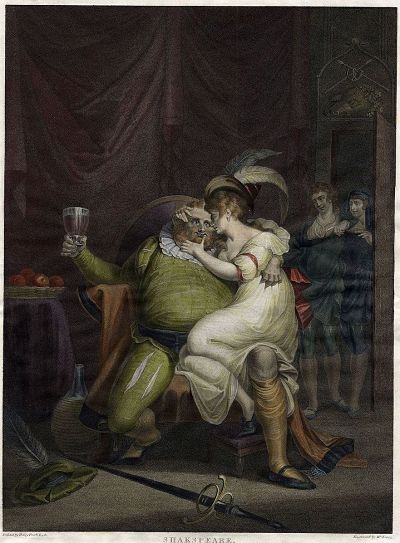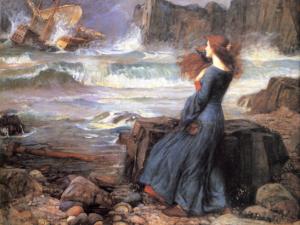 The breakout character can destroy a television show. The most painful part of the original Star Trek series is season three when out of money, ideas, and writers, they decided to service the fans by giving us ever more Spock. The character suffered, the show suffered, the fans eventually realized: we do not always know what we want.
The breakout character can destroy a television show. The most painful part of the original Star Trek series is season three when out of money, ideas, and writers, they decided to service the fans by giving us ever more Spock. The character suffered, the show suffered, the fans eventually realized: we do not always know what we want.
Elizabethan audiences loved the character Sir John Falstaff and that included the Queen who put the Elizabeth in Elizabethan. The rogue is a lovable old sinner . . . and if nobody wants their daughter to marry Sir John, they certainly enjoy laughing at him.
He lives like a giant boy gone to seed. Falstaff is Peter Pan in a world of total depravity, but he is all in good fun until someone gets hurt. This is the problem with a chuckle over the “town drunk character” like Otis in the old Andy Griffith Show. He is funny only if you do not imagine the rest of his life: the damage he does to himself, his family, and to his body.
Falstaff is funny, unless Falstaff ever got real power in the real world: then the rip offs, the drunken behavior is dangerous to everyone, not just the cartoon characters he interacts with in his world.
Falstaff in the two Henry IV plays exists in a parallel England-not the “real world.” Nothing he does impacts great events. His cowardice in battle is not decisive and his petty theft is never allowed to hurt anybody seriously. Shakespeare surrounds him with fun . . . and nobody “real” gets hurt.
The other side of the plays is Hal, the future Henry V, who has become part of Falstaff’s world. He is a prince, not the king, so he enjoys the life of a “lad about town.” Hal makes sure nobody is “hurt” by his fun, but he worries his father.
Henry IV knows the heavy burden of being king. Being a “bad boy” isn’t funny the minute the “naughtiness” leaves the script and enters real life. Jokes about venereal disease are funny to hear, but the disease isn’t. Cowardice in battle is only funny if on the stage. Your mates in the actual fight are counting on you.
We laugh at evil because laughter reminds us that this is not good and makes us absurd. Shakespeare also demonstrates the humanity of the folk the “good people” would condemn. His whores and whore-sons are God-bearers, but nothing in Shakespeare makes a man wish to be Sir John Falstaff.
Shakespeare gave his audience more of Sir John, just as they wished, but he also brutally finished him off when the “reality” of English history demanded Prince Hal become King Henry V.
Whatever reason Hal has for rollicking and sinning, he quits the moment it would matter. Hal pokes at the Lord Justice when he is prince, but exalts him when he becomes king. He has tested the Justice and knows that this good man will oppose even the heir to the throne in the cause of justice.
He knows Falstaff will run away and betray even his friends to get drink, women, gold, or glory. He has tested men and found that generally good men are good and bad men are bad.
Why should we care?
In the hands of a writer less skillful than Shakespeare or less tied to reality, it is easy to give the fans what they wish. Television characters can marry, remarry, kids can be born and then vanish, actions and consequences can be written and rewritten.
When an actor grows old, and the wages of sin show on his face, then the writer can always reboot the series. Captain Kirk need never die. Indiana Jones can “get a son” and make peace with the mother and the boy for being a non-existent parent in a few hours of adventuring.
We might think that Falstaff is not so bad or think living like Otis could be fun. Worst still, we could become a nation of Falstaffs with nobody willing to grow up and lead.
Shakespeare takes his audience and shows what their hero, Henry, must do to their fan favorite Falstaff to be a hero. When King Henry sees Falstaff, the old drunk thinks he will remain the King’s friend, but Henry says:
I know thee not, old man: fall to thy prayers;
How ill white hairs become a fool and jester!
I have long dream’d of such a kind of man,
So surfeit-swell’d, so old and so profane;
But, being awaked, I do despise my dream.
Make less thy body hence, and more thy grace;
Leave gormandizing; know the grave doth gape
For thee thrice wider than for other men.
Reply not to me with a fool-born jest:
Presume not that I am the thing I was;
For God doth know, so shall the world perceive,
That I have turn’d away my former self;
So will I those that kept me company.
When thou dost hear I am as I have been,
Approach me, and thou shalt be as thou wast,
The tutor and the feeder of my riots:
Till then, I banish thee, on pain of death,
As I have done the rest of my misleaders,
Not to come near our person by ten mile.
Henry provides money for Falstaff’s redemption, but he repents of living Falstaff’s life. When I was a boy, I read a heart breaking story of a young man who “grew up” and rejected his virtuous parents. He did not know them . . . but this is the opposite of what Henry does.
Prince Hal becomes the King Henry V that his father wished he would be. He exalts the Justice and rejects injustice. Henry knows his father and “unfriends” his sinful past.
Most of us “sow some wild oats” in our younger years. We experiment and cross lines, but this must stop at adulthood. Television, especially reality television, is not real . . . and we have no script writer, save game feature, or ability to reboot America if things go badly. We must find our fathers, the Lord Justice, and exalt those good men and bid Falstaff repent.
Hal must become Henry and Justice must replace Falstaff or God help us.
———————————————————-
William Shakespeare went to God four hundred years ago. To recollect his death, I am writing a personal reflection on a few of his plays. The Winter’s Tale started things off, followed by As You Like It. Romeo and Juliet still matter, Lady Macbeth rebukes the lust for power, and Henry V is a hero. Richard II shows us not to presume on the grace of God or rebel against authority too easily. Coriolanus reminds us that our leaders need integrity and humility. Our life can be joyful if we realize that it is, at best, A Comedy of Errors. Hamlet needs to know himself better and talks to himself less. He is stuck with himself so he had better make his peace with God quickly and should stay far away from Ophelia. Shakespeare gets something wrong in Merchant of Venice . . . though not as badly as some in the English Labour Party or in my Twitter feed. Love if blind, but intellectualism is blind and impotent in Love’s Labours Lost. Brutus kills Caesar, but is overshadowed by him in Julius Caesar. We should learn not to make Much Ado about Nothing. We might all be Antony, but if we would avoid his fate then we must avoid flattery and the superficial love of Troilus and Cressida. We are fools, but our goal should be to accept it and not to degenerate into Biblical fools during our Midsummer Night’s Dream. Richard III is a symptom of a bad leadership community, but be careful that use Measure for Measure to guide your reaction to the mess. The modern university is Iago in Othello playing on our sins to destroy the nation. You can’t accumulate your way to a great leader and personal piety in Henry VI (Part I) is not enough to make a great king. God will save the King, not our stupid partisan squabbles seen in Henry VI (Part 2) and not kingmakers as existed in Henry VI (Part 3). Fortunately, in God’s world All’s Well That Ends Well. Two Gentlemen remind me that being in love is grand. King John keeps winning and so loses. Slander always gives way to truth in Cymbeline. We need patrons, but God help us if we flatter them and lose them as Athens did with Timon of Athens. We need good leaders and not have to hope against reason that one turns out well like young Prince Hal in Henry IV Part One. Being powerful is all fun and games, until it isn’t as Henry learns in Henry IV Part Two.
















